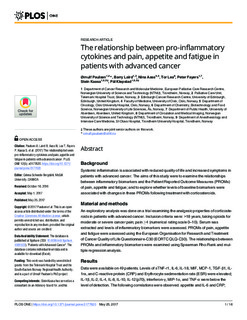| dc.contributor.author | Paulsen, Ørnulf | |
| dc.contributor.author | Laird, Barry J | |
| dc.contributor.author | Aass, Nina Kathrine | |
| dc.contributor.author | Lea, Tor Erling | |
| dc.contributor.author | Fayers, Peter | |
| dc.contributor.author | Kaasa, Stein | |
| dc.contributor.author | Klepstad, Pål | |
| dc.date.accessioned | 2017-09-05T08:00:12Z | |
| dc.date.available | 2017-09-05T08:00:12Z | |
| dc.date.created | 2017-06-27T10:43:51Z | |
| dc.date.issued | 2017 | |
| dc.identifier.issn | 1932-6203 | |
| dc.identifier.uri | http://hdl.handle.net/11250/2453136 | |
| dc.description.abstract | Background
Systemic inflammation is associated with reduced quality of life and increased symptoms in patients with advanced cancer. The aims of this study were to examine the relationships between inflammatory biomarkers and the Patient Reported Outcome Measures (PROMs) of pain, appetite and fatigue; and to explore whether levels of baseline biomarkers were associated with changes in these PROMs following treatment with corticosteroids.
Material and methods
An exploratory analysis was done on a trial examining the analgesic properties of corticosteroids in patients with advanced cancer. Inclusion criteria were: >18 years, taking opioids for moderate or severe cancer pain; pain ≥4 (numerical rating scale 0–10). Serum was extracted and levels of inflammatory biomarkers were assessed. PROMs of pain, appetite and fatigue were assessed using the European Organisation for Research and Treatment of Cancer Quality of Life Questionnaire-C30 (EORTC QLQ-C30). The relationships between PROMs and inflammatory biomarkers were examined using Spearman Rho-Rank and multiple regression analysis.
Results
Data were available on 49 patients. Levels of sTNF-r1, IL-6, IL-18, MIF, MCP-1, TGF-β1, IL-1ra, and C-reactive protein (CRP) and Erythrocyte sedimentation rate (ESR) were elevated; IL-1β, IL-2, IL-4, IL-8, IL-10, IL-12(p70), interferon-γ, MIP-1α, and TNF-α were below the level of detection. The following correlations were observed: appetite and IL-6 and CRP; fatigue and IL-1ra (rs: 0.38–0.41, p< .01). There was no association between pretreatment biomarkers and effect from corticosteroid treatment.
Conclusion
In patients with advanced cancer and pain, some pro-inflammatory cytokines were related to appetite and fatigue. Inflammatory biomarkers were not associated with pain or with the efficacy of corticosteroid therapy. Further research examining the attenuation of the systemic inflammatory response and possible effects on symptoms would be of interest. | nb_NO |
| dc.language.iso | eng | nb_NO |
| dc.publisher | Public Library of Science | nb_NO |
| dc.rights | Navngivelse 4.0 Internasjonal | * |
| dc.rights.uri | http://creativecommons.org/licenses/by/4.0/deed.no | * |
| dc.title | The relationship between pro-inflammatory cytokines and pain, appetite and fatigue in patients with advanced cancer | nb_NO |
| dc.type | Journal article | nb_NO |
| dc.type | Peer reviewed | nb_NO |
| dc.description.version | publishedVersion | nb_NO |
| dc.source.volume | 12 | nb_NO |
| dc.source.journal | PLoS ONE | nb_NO |
| dc.source.issue | 5 | nb_NO |
| dc.identifier.doi | 10.1371/journal.pone.0177620 | |
| dc.identifier.cristin | 1479113 | |
| dc.description.localcode | © 2017 Paulsen et al. This is an open access article distributed under the terms of the Creative Commons Attribution License, which permits unrestricted use, distribution, and reproduction in any medium, provided the original author and source are credited. | nb_NO |
| cristin.unitcode | 194,65,15,0 | |
| cristin.unitcode | 194,19,41,20 | |
| cristin.unitname | Institutt for kreftforskning og molekylær medisin | |
| cristin.unitname | Videreutdanning | |
| cristin.ispublished | true | |
| cristin.fulltext | original | |
| cristin.qualitycode | 1 | |

